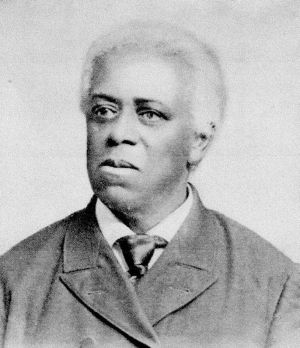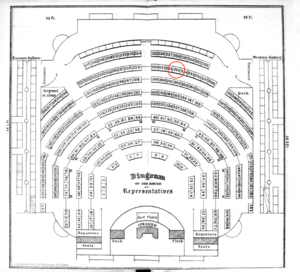Edward G. Walker facts for kids
Quick facts for kids
Edward G. Walker
|
|
|---|---|

Edward G. Walker (1830–1901), son of David Walker (abolitionist), one of the first two black men elected to the Massachusetts State Legislature.
|
|
| Member of the Massachusetts House of Representatives from the 3rd Middlesex district |
|
| In office 1867–1867 |
|
| Personal details | |
| Born | 1830 Edgefield, South Carolina |
| Died | 1901 Quincy, Massachusetts |
| Political party | Republican (before 1868) Democratic Negro Party (1896) |
| Parents | David Walker Eliza Walker |
Edward Garrison Walker (1830–1901) was an important American leader. He was also known as Edwin Garrison Walker. He started as a skilled leather worker in Boston. Later, he became a lawyer. In 1861, he was one of the first Black men to become a lawyer in Massachusetts. In 1866, he and Charles Lewis Mitchell made history. They were the first two African Americans elected to the state government in Massachusetts. Edward Walker was the son of Eliza and David Walker. His father was a strong supporter of ending slavery. David Walker wrote an important book called An Appeal to the Colored Citizens of the World in 1829.
Contents
Edward Walker's Early Life
Edward Garrison Walker was born in Edgefield, South Carolina, in 1830. His father, David Walker, had died just before Edward was born. David Walker was a free Black man from North Carolina. He moved to Boston around 1825. There, he became a well-known leader against slavery.
After David Walker passed away, Edward's mother, Eliza, faced tough times. She could not afford to keep their home. In 1833, Eliza married Alexander Dewson. Alexander had a son named Alexander, who was about Edward's age. Edward grew up in Charlestown, Massachusetts. He went to public schools there.
Learning a Trade
When Edward was young, he learned how to work with leather. This skill helped him start his own business. His business grew and eventually hired 15 people.
Fighting for Freedom
Edward Walker followed in his father's footsteps. He became a strong supporter of ending slavery. In 1851, he worked with lawyer Robert Morris and activist Lewis Hayden. They helped a man named Shadrach Minkins. Minkins was a formerly enslaved person from Virginia. He had been arrested in Boston under a law called the Fugitive Slave Act of 1850. This law said that people in free states had to help return enslaved people to their owners.
Walker and his friends helped Minkins escape to Canada. He settled safely in Montreal. Many people in Boston did not like the 1850 law. They were proud of Walker and his friends for helping Minkins. Walker also worked hard for equal rights for all people. In 1855, Black children in Boston were finally allowed to attend city schools with all other children. This happened after many years of effort by people like Walker.
Family Life
Edward Walker married Hannah Jane Van Vronker on November 15, 1858. He was 28 years old, and Hannah was 23. They had a son named Edwin Eugene and two daughters, Georgiana Grace and Eliza Ann. For a time, the family lived with Edward's mother, Eliza.
Becoming a Lawyer
Edward Walker was inspired to become a lawyer. He learned about law by working with other lawyers. This was like an apprenticeship. He worked in the office of Charles A. Tweed and John Q. A. Griffin. He also kept running his leather business. In May 1861, he became a lawyer in Massachusetts. He was one of the first Black lawyers in the state. People in Boston thought he was a very good lawyer.
Serving in Government
In 1866, Edward Walker was elected to the Massachusetts House of Representatives. He represented a part of Middlesex County. At the same time, Charles Lewis Mitchell, a veteran of the Union Army, was also elected. They were the first two African Americans ever elected to the Massachusetts state government. Both men were members of the Republican Party.
Their election was a big deal. It happened after the American Civil War. During this time, called Reconstruction, many changes were happening. Slavery had ended in 1865. New amendments to the U.S. Constitution were passed. The 14th Amendment gave full citizenship to formerly enslaved people. The 15th Amendment gave Black men the right to vote and hold public office.
In the Massachusetts House, Walker had a different idea about the 14th Amendment. He felt its words did not do enough to stop unfair treatment based on race. Because of this, he disagreed with other Republicans. They did not choose him to run for a second term. So, he joined the Democratic Party. Many other Black people in Boston also switched parties because they were not happy with the Republicans.
Later Political Work
Walker continued his political career. In 1883, the Democratic Governor tried to make Walker a state judge. But the state legislature, which was mostly Republican, said no. They chose another African American lawyer instead. Walker was nominated for judge three times, but the legislature always rejected him. He also tried to get local government jobs in Boston, but he was not successful.
In 1885, Walker helped start the Negro Political Independence Movement. He became the president of the Colored National League in 1890. In 1896, he was even nominated to run for President of the United States by the Negro Party.
Death
Edward Walker passed away from pneumonia on January 13, 1901, in Boston. Many people remembered his important work. Julius Caesar Chappelle, another African-American Massachusetts legislator, spoke at a memorial for him.
Images for kids
 | James B. Knighten |
 | Azellia White |
 | Willa Brown |



